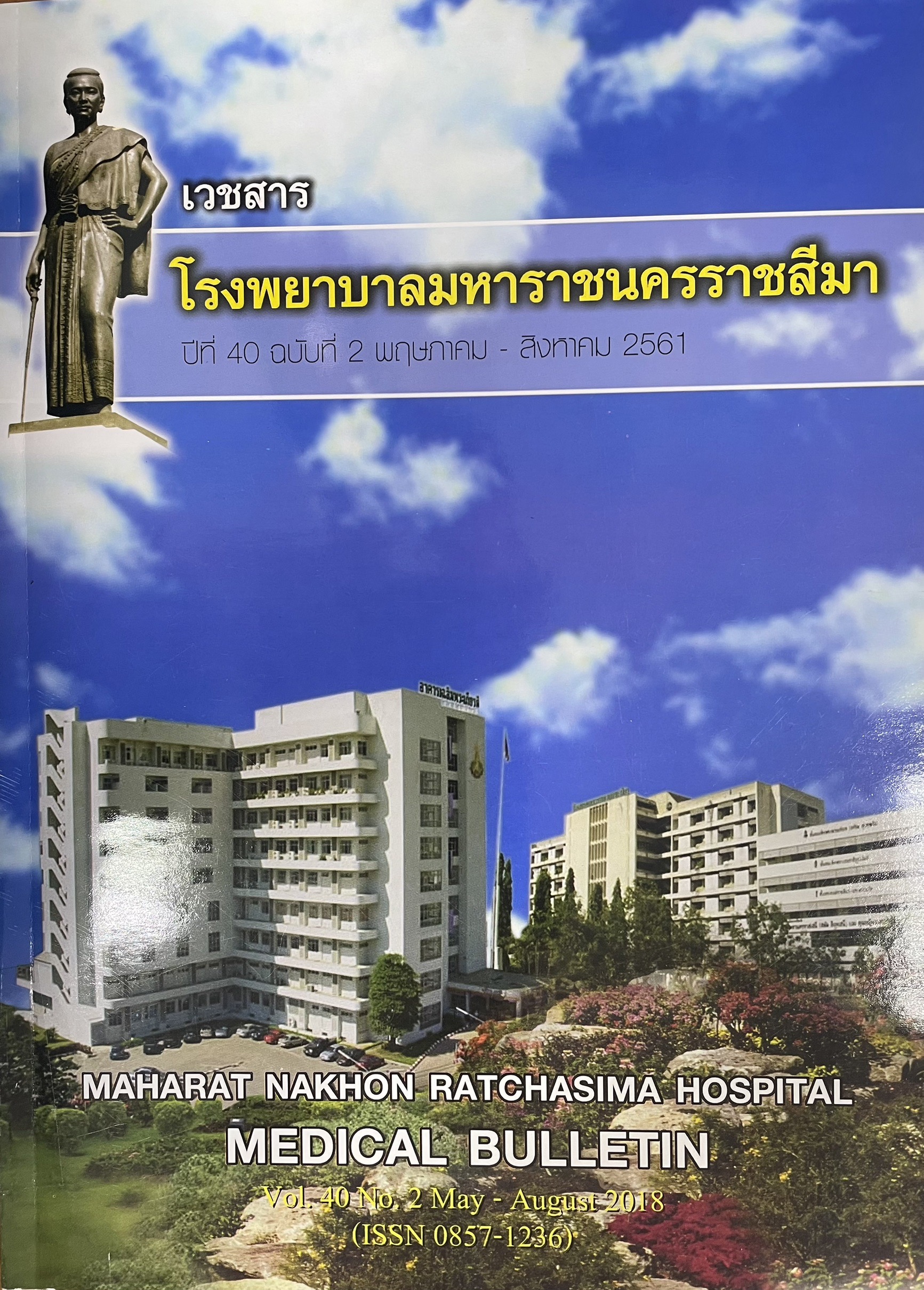Clinical factors contributing readmission in 28 days due to acute exacerbation in COPD patients in Maharat Nakhon Ratchasima Hospital
Main Article Content
Abstract
Chronic obstructive pulmonary disease, COPD) can be occasionally complicated by acute exacerbation generally leading to increased morbidity and mortality. This research was aimed to describe the clinical characteristics of the COPD patients, the treatment outcomes and the clinical factors contributing the acute exacerbation resulting in readmission within 28 days. This study was retrospective descriptive, recruiting the COPD patients who were readmitted within 28 days due to acute exacerbation since 1 Oct 2013 - 30 Jun 2015 in Maharat Nakhon Ratchasima Hospital. There were 83 patients who fulfilled the inclusion criteria, mean age 72.7 years, 77 males and 6 females. For smoking, 40 were ex-smokers whereas 31 (37.3 %) were current smokers. The following parameters were in two groups, the first admission and the readmission groups, respectively. Oxygen mask with bag was offered in 44.6 % and 36.1 %, respiratory support with ventilator in 55.4 % and 63.9 %, corticosteroid injection in 97.6 % and 91.6 %, bronchodilator aerosol in 100 % and 98.8 %, antibiotics administration in 92.8 % and 89.2 %, respectively. The most common contributing factors for acute exacerbation was pneumonia in 51.8 % and 71.1 % and the most common causative organism was Ps. aeruginosa (20.9 %) and A. baumannii (30.5 %). The hospital stay day was averagely 4.4 days and 7.2 days. The expense was 17,910 Baht and 36,239 Baht in the first admission and in readmission groups, respectively. Thirty patients in the readmission group were dead (36.1 %). In conclusion, pneumonia was the important contributing factor for acute exacerbation leading to readmission within 28 days resulting in increased morbidity and mortality in COPD patients.
Article Details

This work is licensed under a Creative Commons Attribution-NonCommercial-NoDerivatives 4.0 International License.
References
Murray C, Lopez A. Mortality by cause for eight regions of the world: global burden of disease study. Lancet 1997; 349:1269-76.
Seemungal TAR, Donaldson GC, Paul EA, Bestall JC, Jeffries DJ, Wedzicha JA. Effect of exacerbation on quality of life in patients with chronic obstructive pulmonary disease. Am J Respir Crit Care Med 1998; 157: 1418-22.
Donaldson GC, Seemungal TAR, Bhowmik A, Wedzicha JA. Relationship between exacerbation frequency and lung function decline in chronic obstructive pulmonary disease. Thorax 2002; 57: 847-52.
Andersson F, Borg S, Jansson SA, Jonsson AC, Ericsson A, Prutz C, et al. The costs of exacerbations in chronic obstructive pulmonary disease (COPD). Respir Med 2002; 96: 700-8.
Chapman KR, Mannino DM, Soriano JB, Vermeire PA, Buist AS, Thun MI, et al. Epidemiology and costs of chronic obstructive pulmonary discase. Eur Respir J 2006: 27:188-207.
Almagro P, Calbo E, deEchagien AO, Barrciro B, Quintana S, Heredia JI, et al. Mortality after hospitalization for COPD. Chest 2002; 121: 1441-8.
Groenewegen KH, ScholsAM, Wouters EF. Mortality and mortality-related factors after hospitalization for acute exacerbation of COPD. Chest 20033 124: 459-67.
Global Initiative for Chronic Obstruction Lung Disease (GOLD) 2014. Global strategy for the diagnosis, managoment, and prevention of chronic obstructive pulmonary disease. Revised 2011, 2014 [cited 2014 Apr 10]. Available from:htp://www.goldcopd.org/.
Lode H, Allewelt M, Balk S, de Roux A, Mauch H, Niederman M. A prediction model for bacterial etiology
in acute cxacerbations of COPD. Infection 2007;35: 143-9.
Anthonisen N, Manfreda J, Warren C, Hershfield ES, Harding GK, Nelson NA. Antibiotic therapy in exacerbations of chronic obstructive pulmonary disease. Ann Intern Med 1987; 106: 196-204.
Butorac-Petanjek B, Parnham MJ, Popvic-Grle S. Antibiotic therapy for COPD exacerbation. J Chemother 2010; 22: 291-7.
Lin SH, Kuo PH, Hsueh PR, Yang PC, Kuo SH. Sputum bacteriology in hospitalized patients with acute exacerbation of chronic obstructive pulmonary disease in Taiwan with an emphasis on Klebsiella pneumonia and Pseudomonas aeruginosa. Respirology 2207; 12: 81-7.
Eller J, Ede A, Schaberg T, Niederman M, Maunch H, Lode H. Infective exacerbations of chronic bronchitis: relation between bacteriological etiology and lung function. Chest 1998; 113:1542-8.
McIntyre N, Huang YC. Acute exacerbation and respiratory failure in chronic obstructive pulmonary disease. Proc Am Thorac Soc 2008; 5: 530-5.
Soto FJ, Varkey B. Evidence-based approach to acute exacerbations of COPD. Curr Opin Pulm Med 2003; 9: 117-24.
Reechaipichitkul W. Precipitating causes and outcomes of chronic obstructive pulmonary disease exacerbation at a tertiary care center in northeast Thailand. Asian Biomedicine 2014; 8: 229-36.
Gajanan G, Jyothi H, Chanudhury A. Risk factors for frequent hospital readmissions for acute exacerbations of COPD. Clinical medicine research 2013; 2:167-73.
Chan FW, Wong FY, Yam CH, Cheung W, Wong EL, Leung MC, et al. Risk factors of hospitalization and readmission of patients with COPD in Hong Kong population. BMC Health Services Research 2011; 11: 186.
McGhan R, Sutherland R, Welsh C, Make B. Predictors of rehospitalization and death after a severe exacerbation of COPD. Chest 2007; 132:1748-55.


